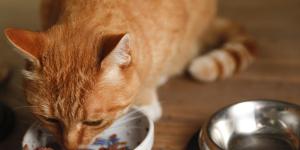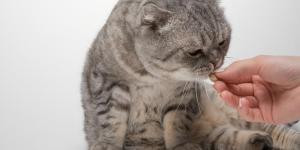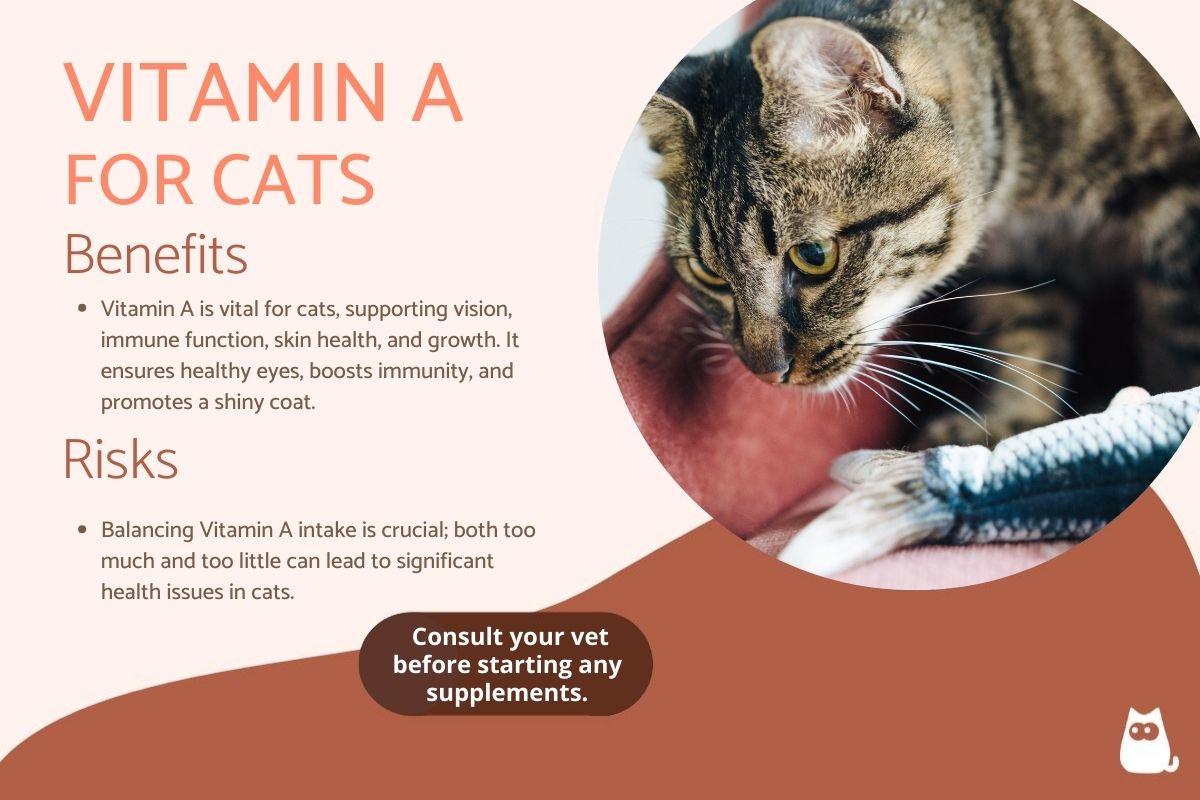Vitamin A for Cats - Dosage & Safe Levels



See files for Cats
Cats, like all living beings, rely on essential nutrients to stay healthy. One crucial nutrient is vitamin A, but unlike treats or kibble, a little goes a long way. While vitamin A is vital for feline health, it's a micronutrient, meaning too much or too little can have negative effects. Since cats can't produce vitamin A on their own, it needs to come from their diet.
This article by AnimalWised dives deep into the importance of vitamin A for cats. We'll explore its benefits, how to identify a deficiency, and most importantly, how to ensure your feline friend gets the right amount.
Importance of vitamin A in cats
Vitamin A is a fat-soluble vitamin, meaning it gets stored in the body's fat tissues. It's actually not a single vitamin, but a group of related compounds with similar properties. Vitamin A is a crucial nutrient for cats and plays a vital role in several important bodily functions:
- Vitamin A directs cell differentiation, a crucial process for forming essential tissues like teeth, nails, skin, and bones.
- The antioxidant effects of vitamin A help control aging by combating free radicals, unstable molecules that can damage cells.
- Vitamin A is essential for maintaining healthy skin, hair, and mucous membranes, which are all types of epithelial tissues.
- This vital nutrient supports proper immune system function by regulating white blood cell production, the body's defense against infections.
- Vitamin A is necessary for proper vision, particularly in low light conditions.
- It plays a key role in both male and female reproductive health.
- Vitamin A contributes to healthy kidney function by facilitating essential processes within these organs.
- This vitamin is essential for the synthesis of various hormones, which regulate crucial bodily functions.
While essential, excessive vitamin A intake can be toxic for cats. Symptoms include weight loss, lethargy, bone deformities, and vomiting. It's crucial to avoid over-supplementation and stick to a balanced diet formulated for cats.
Read on to learn about kidney problems in cats.
When to give vitamin A to a cat?
The good news is that healthy cats on a well-balanced commercial diet typically don't need additional vitamin A supplements. High-quality cat food is specifically formulated to provide all the essential nutrients your feline friend needs, including the right amount of vitamin A for their life stage.
Kittens require more vitamin A for proper growth and development, but most high-quality kitten food formulas already take this into account. Similarly, pregnant and nursing cats may have slightly higher vitamin A needs, but consulting your veterinarian is crucial before giving any supplements, as too much vitamin A can be harmful.
In rare cases, cats can experience vitamin A deficiency due to a restricted diet, certain medical conditions, or prolonged illness. A veterinarian can diagnose a deficiency and recommend a proper treatment plan, which might include vitamin A supplementation.
The bottom line is that for most healthy cats, a balanced commercial cat food is the best way to ensure they get the right amount of vitamin A. It's always best to consult your veterinarian before giving your cat any supplements, including vitamin A.
Do not miss this other article on the best diet for cats.
Vitamin A dosage for cats
Determining the appropriate vitamin A intake, if any, requires a veterinarian's assessment of your cat's individual needs. They can consider factors like age, breed, health conditions, and current diet to determine the safest and most effective course of action.
As mentioned before, excessive vitamin A intake can be toxic for cats, causing symptoms like weight loss, lethargy, bone deformities, and vomiting. The safe dosage varies depending on the cat's age, health status, and overall diet.
Signs of vitamin A deficiency
Vitamin A deficiency in cats occurs when they don't have enough of this essential nutrient in their bodies. It can lead to a variety of health problems that affect their vision, immune system, skin and coat, growth, and reproduction. Here are the most common signs:
- Night blindness
- Dry eyes
- Corneal cloudiness (severe).
- Dry and flaky skin
- Increased skin infections
- Frequent infections
- Delayed wound healing
In the case of kittens, they can also experience stunted growth and delayed development.
What can cause a vitamin A deficiency?
- Dietary imbalances: This can happen with homemade diets that lack essential nutrients or with poor-quality commercial food that doesn't meet a cat's specific needs.
- Digestive problems: Certain medical conditions can affect how well your cat absorbs nutrients from their food, including vitamin A.
- Liver issues: the liver plays a key role in storing and processing vitamin A. If your cat has liver disease, it can disrupt this process and lead to a deficiency.
- Chronic health issues: cats battling chronic illnesses may experience a depletion of their vitamin A stores due to the increased demands placed on their bodies.
Read on to learn about the importance of vitamin B for cats.
How to give vitamin A to a cat?
If you suspect your cat has a vitamin A deficiency or requires additional supplementation due to specific health needs, consult your veterinarian. Only they can diagnose any underlying issues and recommend the appropriate course of action.
Vitamin A supplements come in various forms (capsules, liquids, etc.), and some might be difficult for cats to ingest or absorb. Cats may struggle to swallow capsules or tablets whole, for example, and crushing them can alter the absorption rate of the vitamin A, making it less effective.
Veterinary clinics often carry cat-specific vitamin A supplements formulated for feline palatability and ease of administration.
- Flavorful gels: these gels are often flavored with enticing tastes like tuna or chicken, making them more appealing to cats.
- Chewable tablets: these specially formulated tablets are designed to be palatable for cats and may be easier to ingest compared to human tablets.
If a vitamin A deficiency stems from a dietary issue, your veterinarian might recommend adjusting your cat's food type or adding specific vitamin A-rich foods to their diet, such as small amounts of cooked liver or canned fish (always consult your vet before introducing new foods).
Foods with vitamin A for cats
While a balanced commercial cat food should provide most healthy cats with the vitamin A they need, there are some situations where a veterinarian might recommend adding vitamin A-rich foods to your cat's diet. Here are some options to consider:
- Liver: this is the richest natural source of vitamin A for cats. However, due to its high potency, it should only be offered in small quantities (a teaspoon or two, cooked, a few times a week) to avoid toxicity.
- Fish: oily fish like salmon, tuna, and sardines are good sources of vitamin A. Cooked options are best, and portions should be moderate (a tablespoon or two, a few times a week) to avoid digestive issues and excessive fat intake.
- Eggs: cooked egg yolks contain some vitamin A and other beneficial nutrients. However, due to the high cholesterol content, offer only a small amount (a quarter-teaspoon or less) occasionally.
Even these natural sources can be too much for your cat if they are already getting enough vitamin A from their food. Over-supplementation can lead to vitamin A toxicity. Remember, a balanced commercial cat food formulated for your cat's life stage should be the primary source of vitamin A. These foods are carefully designed to meet their nutritional needs in a safe and complete way.

If you want to read similar articles to Vitamin A for Cats - Dosage & Safe Levels, we recommend you visit our Healthy diets category.
- GEMFE. Cats and food . Available at: https://www.avepa.org/articulos/alimentacion.html
- Villagrasa, M. (2016). Nutrients for a perfect coat. Ateuves Magazine No. 36. pp. 10-15.
- Villagrasa, M. (2018). Vitamin cocktail. Ateuves Magazine No. 46. pp. 14-19.






